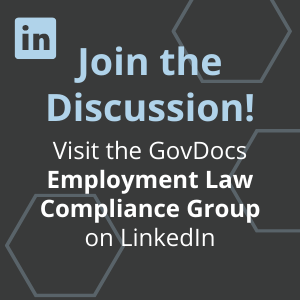EMPLOYMENT LAW NEWS
Ballot Measures Breakdown:
Alaska and Nebraska
By Jana Bjorklund, GovDocs Senior Counsel and Director
Employment Law and Compliance
October 22, 2024

As the election draws near, GovDocs covers the latest Ballot Measures Breakdown in Alaska and Nebraska.
In recent years, significant shifts in employment laws have paved the way for ballot measures addressing minimum wage adjustments and paid sick leave requirements. GovDocs is watching these ballot measures and will bring you a series of blogs for the remainder of this month providing details on which states have similar ballot measures to be decided in the November election.
To start, we will cover Alaska’s and Nebraska’s ballot measures.
Alaska
Alaska’s Ballot Measure No. 1 is a citizen-initiated ballot measure that, if passed, would amend Alaska’s state statutes by increasing the state’s minimum wage, requiring employers in Alaska to provide employees with paid sick leave, and prohibiting employers from requiring employees to attend meetings about religious or political issues.
Alaska Minimum Wage Increases
The ballot measure proposes to increase the state’s minimum wage to $13 per hour on July 1, 2025. The wage would then increase to $14.00 per hour on July 1, 2026 and to $15.00 per hour on July 1, 2027. After this, the minimum wage would increase with inflation.
Paid Sick Leave Requirements
This ballot measure would also enact paid sick leave requirements for employers depending on the employer size. Employees must accrue 1 hour of paid sick leave for every 30 hours worked. Small employers with less than 15 employees would be required to provide employees up to 40 hours of paid sick leave per year. Large employers with 15 or more employees would be required to provide employees with up to 56 hours of paid sick leave per year.
The paid sick leave requirements would begin July 1, 2025 and could be taken for the following:
- Due to the employee’s mental or physical illness, injury, or health condition;
- To care for a family member due to their mental or physical illness, injury, or health condition;
- For safe time absences related to domestic violence, sexual assault or stalking.
Alaska Captive Audience Ban
Finally, Alaska’s ballot measure also would enact a statute prohibiting employers from requiring attendance at or taking adverse against an employee who refuses to attend an employer sponsored meeting to communicate the employer’s position about religious or political matters. This has been a trend in employment law recently with approximately eight other states having passed such laws.
Nebraska – Paid Sick Leave
Nebraska’s Initiative Measure 436 would also amend the state’s statutes and require employers to provide paid sick leave to employees. Under Nebraska’s ballot measure, employers with 20 or more employees would be required to provide up to 56 hours paid sick leave per year. Employers with less than 20 employees would be required to provide employees with up to 40 hours paid sick leave per year.
Under this initiative, employees need to accrue paid sick leave at a rate of 1 hour for every 30 hours worked and the law would be effective October 1, 2025. Employees would be able to take paid sick leave for the following:
- To care for the employee’s own mental or physical illness, injury or health condition;
- To care for a family member due to their mental or physical illness, injury or health condition;
- The closure of the employee’s place of business or a family member’s school or place of care due to an official public health emergency; and
- The need to self-isolate or care for a family member due to the exposure to a communicable disease.
Conclusion
These ballot measures, along with others on state’s ballots in November, signals a shift to more equitable workplace standards. Stay tuned for our upcoming blogs this month detailing other ballot measures poised to impact minimum wage or paid sick leave next year.
Keep Informed
with GovDocs Employment Law News




